A STIRRING MENTAL EXERCISE WELL DONE
In reviewing A.C.T.’s Arcadia, I feel compelled to begin with a caveat: It is a highly cerebral work – a tapestry of threads connected by bloodlines, theories, and time that requires constant focus. Those with a literary turn of mind, who revel in being 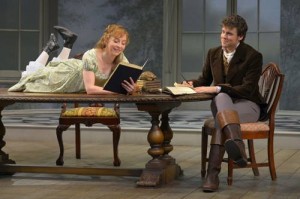 made to think, will find this play a sheer delight, while the everyday theatergoer may find the script challenging. Yet while the play – in which past and present gracefully take turns until they inexorably overlap – is brainy and highbrow, director Carey Perloff and her design team ensure a rewarding theatrical experience by emphasizing both the academical and emotional aspects of Tom Stoppard’s masterpiece. Those playgoers with furrowed brow will find themselves drawn in by the beautiful staging, captivating characterizations, and increasingly haunting proceedings – all of which lead to a memorable conclusion.
made to think, will find this play a sheer delight, while the everyday theatergoer may find the script challenging. Yet while the play – in which past and present gracefully take turns until they inexorably overlap – is brainy and highbrow, director Carey Perloff and her design team ensure a rewarding theatrical experience by emphasizing both the academical and emotional aspects of Tom Stoppard’s masterpiece. Those playgoers with furrowed brow will find themselves drawn in by the beautiful staging, captivating characterizations, and increasingly haunting proceedings – all of which lead to a memorable conclusion.
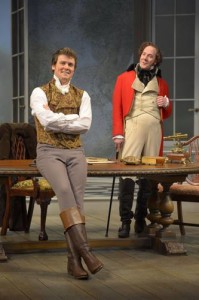 A growing swirl of academics and attraction occurs in 1809 when the comely but doomed young Thomasina Coverly (a delightful Rebekah Brockman) puzzles over mathematics and the meaning of “carnal” with her long-suffering tutor Septimus (Jack Cutmore-Scott). Also on the scene is landscape architect Richard Noakes (Anthony Fusco), who proposes redoing the grounds and adding a forest-surrounded hermitage. Thomasina playfully sketches a hermit into his plans.
A growing swirl of academics and attraction occurs in 1809 when the comely but doomed young Thomasina Coverly (a delightful Rebekah Brockman) puzzles over mathematics and the meaning of “carnal” with her long-suffering tutor Septimus (Jack Cutmore-Scott). Also on the scene is landscape architect Richard Noakes (Anthony Fusco), who proposes redoing the grounds and adding a forest-surrounded hermitage. Thomasina playfully sketches a hermit into his plans.
In the same room 200 years later, author Hannah Jarvis (a driven and intense Gretchen Egolf) and Byron scholar Bernard Nightingale (a highly passionate Andy Murray) strive to unravel the past concerning Lord Byron (who is a compelling presence throughout, even though he is never a character onstage). Bernard is on fire to answer questions about why Byron left England in summer 1809. Perhaps his sudden departure was due to a duel with 19th century poet Ezra Chater (played as a true 19th-century dandy by Nicholas Pelczar). Stoddard’s clever structure has Thomasina’s hermit sketch resurface with major implications.
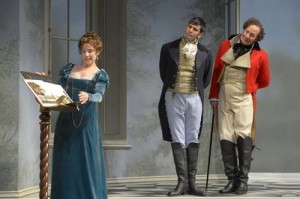 Literature intertwines, and love – with all of its dualities, skirmishes and duels – fuels the action-packed, humor-spiced, and cerebral-filled story. Thomasina tells her tutor she saw her mother, Lady Croom (a regally elegant Julia Coffey, with simmering fervency underneath) in a compromising situation with houseguest Byron, and then works out a mathematical equation that describes an apple leaf. Well-penned intellectual comedy flourishes when Septimus finds himself engaged to duel with both Chater and naval Capt. Brice (a staid and solid Nick Gabriel). Ken Ruta’s appearance as the shuffling and elderly (but by no means blind) butler Jellaby heightens the atmospheric mischiefs.
Literature intertwines, and love – with all of its dualities, skirmishes and duels – fuels the action-packed, humor-spiced, and cerebral-filled story. Thomasina tells her tutor she saw her mother, Lady Croom (a regally elegant Julia Coffey, with simmering fervency underneath) in a compromising situation with houseguest Byron, and then works out a mathematical equation that describes an apple leaf. Well-penned intellectual comedy flourishes when Septimus finds himself engaged to duel with both Chater and naval Capt. Brice (a staid and solid Nick Gabriel). Ken Ruta’s appearance as the shuffling and elderly (but by no means blind) butler Jellaby heightens the atmospheric mischiefs.
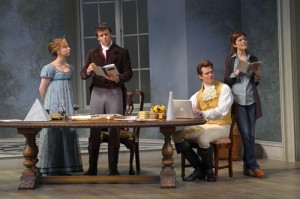 Timelines two centuries apart inevitably come together through Thomasina, her brother Augustus and their 21st- century Coverly descendants: The emergence of Thomasina’s apple-leaf deductions, which foreshadows the second law of thermodynamics, upends Bernard’s theories; there is a steam engine and the chancy interplay of history; and we see a modern-day party with period costumes – a party where we meet Coverly descendants Chloe (a sparkly Allegra Rose Edwards) and Gus (a shadowy Titus Tompkins who also plays Augustus in a lovely turn of throwback casting). Characters share each other’s ambiance as past and present crystallize in an emotionally stirring waltz with Thomasina and Septimus and Hannah and Gus (plus a final clue as to just who the hermit in the sketch is).
Timelines two centuries apart inevitably come together through Thomasina, her brother Augustus and their 21st- century Coverly descendants: The emergence of Thomasina’s apple-leaf deductions, which foreshadows the second law of thermodynamics, upends Bernard’s theories; there is a steam engine and the chancy interplay of history; and we see a modern-day party with period costumes – a party where we meet Coverly descendants Chloe (a sparkly Allegra Rose Edwards) and Gus (a shadowy Titus Tompkins who also plays Augustus in a lovely turn of throwback casting). Characters share each other’s ambiance as past and present crystallize in an emotionally stirring waltz with Thomasina and Septimus and Hannah and Gus (plus a final clue as to just who the hermit in the sketch is).
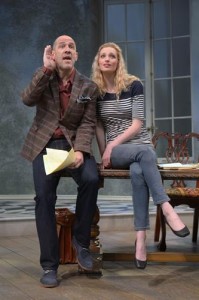 Douglas W. Schmidt’s soaring set of a drawing room fronts the garden of a sprawling Derbyshire country house. Its tall windows and design of leafy branches soar to the ceiling both enclosing and highlighting characters as if they were on a stage, promoting the idea of two bubbles flowing together in the stream of time. Robert Werzel’s lighting design beautifully delineates past and present while imbuing each with its own character. Alex Jaeger’s costumes do the same, but they go even further in underlining the characters and their times.
Douglas W. Schmidt’s soaring set of a drawing room fronts the garden of a sprawling Derbyshire country house. Its tall windows and design of leafy branches soar to the ceiling both enclosing and highlighting characters as if they were on a stage, promoting the idea of two bubbles flowing together in the stream of time. Robert Werzel’s lighting design beautifully delineates past and present while imbuing each with its own character. Alex Jaeger’s costumes do the same, but they go even further in underlining the characters and their times.
I couldn’t let my attention wander watching this play. The sheer craft in the unfolding and intertwined story and the play’s bold premise are astounding, as is the actors’ engaging work. While Schmidt’s idyllic set and the fine acting counterbalance the play’s highly cerebral quality, I fear some may find the script’s abstract theories tedious. For those who do, though, I found the ending of the play, both bittersweet and beautifully executed, to be worth it. Fact, speculation, historical figures, and fictionalized counterparts all materialize as flesh-and-blood in ways that made me ponder the subtleties of universal laws while appreciating theater as a vehicle to bridge the boundaries of past and present, the real and imaginary. Arcadia springs from creative genius and makes me want to know more about the world. As Hannah says, “It’s wanting to know that makes us matter.”
photos by Kevin Berne
Arcadia
A.C.T. at American Conservatory Theater’s Geary Theater
scheduled to end on June 9, 2013 EXTENDED to June 16, 2013
for tickets, call (415) 749-2228 or visit http://www.act-sf.org

